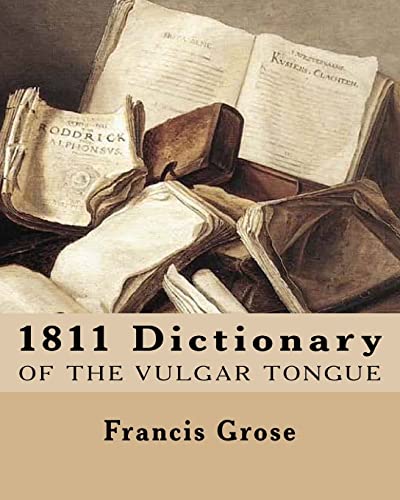1811 Dictionary of the Vulgar Tongue
Francis Grose
BOOK REVIEW

In the swirling depths of the English language, where the elegant mingles with the absurd, one tome rises to the occasion with a raucous cheer: the 1811 Dictionary of the Vulgar Tongue by the irreverent Francis Grose. Dive into this rich literary tapestry woven from the threads of jests, slurs, and all manners of cheeky vernacular that danced through the pub-filled streets of early 19th-century London. This isn't merely a dictionary; it's a riotous celebration of the colorful, the crass, and the hilariously vulgar!
Picture yourself wandering through a bustling marketplace, the air thick with the scent of roasted meats and the raucous laughter of men and women united in wit and banter. Grose captures that essence, inviting you into a world where language is no stiff formality but a lively player in the theater of life. His dictionary pulsates with life, offering a smorgasbord of slang that tempts the reader to indulge in a feast of linguistic delights.
Why does this collection matter? The 1811 Dictionary of the Vulgar Tongue serves as a crucial cultural artifact, shedding light on an era when language was both a weapon and a shield, a tool for camaraderie and a battleground for social status. Grose's work not only chronicles the words spoken by the common folks-the laborers, tradesmen, and rascals-but it also serves as a mirror reflecting societal norms, values, and humor of the time. Each entry is a time capsule, turquoise with the joy of rebellion, humor, and a pinch of scandal.
Critics and readers alike have been drawn to Grose's unapologetic honesty. Many find delight in the shock of the vulgarity itself, while some debate the morality of preserving such titillating expressions. Yet, therein lies the magic-the same way a robust painting of a chaotic scene can spark debate, this dictionary ignites conversations about language, class, and the human experience itself. The eclectic mix of terms reveals much about the social fabric of the early 1800s-where laughter and injury coalesce seamlessly.
Among the entries, one can find gems like "blue devil," or the whimsical "dandypratt," capturing the spirit of an era filled with idiosyncrasy. Readers have embraced its tongue-in-cheek humor, often sharing passages that evoke laughter in the modern world, proving that the essence of human experience is timeless. The vulgarity translates beautifully into contemporary humor, reminding us that accountability to our own authentic expressions is an age-old struggle.
As you delve into Grose's world, consider the impact of this work. It isn't just about learning sordid phrases; it's about recognizing the importance of reclaiming our language, the way we converse, and the culture that shapes our conversations. This dictionary is a testament to the power of words, encouraging you to find your own voice amidst societal constraints.
A sprinkle of humor, a dash of rebellion, and an insatiable thirst for self-expression lie at the heart of the 1811 Dictionary of the Vulgar Tongue. This masterpiece urges you to explore the beautifully chaotic, the hilariously crude, and the cleverly rebellious. Don't get left behind in the mundane; embrace the vibrant language that has painted our history with strokes of laughter and audacity. Why let the echoes of the past fade into silence when you can relish in their humor today?
📖 1811 Dictionary of the Vulgar Tongue
✍ by Francis Grose
🧾 278 pages
2012
#1811 #dictionary #vulgar #tongue #francis #grose #FrancisGrose